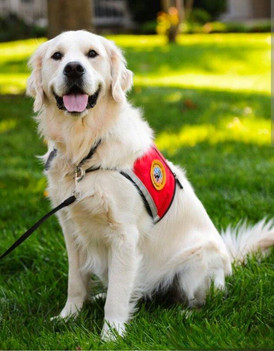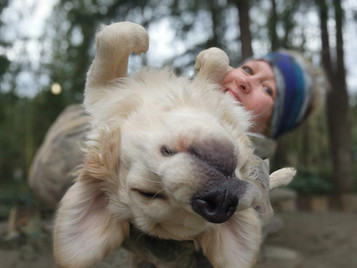What Makes a Good Service Dog? Understanding the Traits Behind Exceptional Partners
- Hoekema Family

- Nov 23, 2025
- 5 min read
Let me start by saying, that I am in no way an expert in the service dog world, I’m not trained, certified or professionally educated in the field. However, I have spent countless hours learning from professionals across service, therapy, and emotional support disciplines. Its incredibly important to me to understand what it truly takes for a dog to thrive in this kind of work so I can help guide my families in making the best match for their family and situation.
Because of that, I am extremely intentional and selective about the lines and individual dogs I bring into my program. My focus is not only on meeting AKC standards, but on cultivating dogs whose temperament shine with strength, stability, and purpose. Many of my pups go into family companion homes but I have also been blessed to place pups with the opportunity to go on to working positions.
Temperaments are woven into a dog’s genetics far more than people realize. That’s why every dog in my program has been intentionally and thoughtfully chosen – not just to be part of my world, but to contribute to a breeding program built on stability, reliability, and exceptional character and demeanor.
When people ask which mama would suit their lifestyle and family dynamic the best, I always tell them this: I have full and complete faith in all my dogs here to produce pups of exceptional quality – pups with the temperament, resilience, and heart to rise to whatever life brings their way. Whether it's a companion family pup, a pup to heal a young child's anxiety, a pup to help guide a lost soul, a pup to complete daily tasks or any and all of the above.
Isla currently has pups pursuing paths in service, therapy and emotional support work, which speaks volumes about the strength of her temperament. However, that’s not to say that Leia is any less capable of producing pups who can go on to serve in those same roles. Neema is only beginning her journey here with her first litter, so she simply doesn’t have a track record yet – but that doesn’t diminish her potential in the slightest.
As I learn from breeders, trainers, therapist, teachers and professionals throughout the service world, I gather every bit of insight I can. I apply that knowledge when families ask for guidance during the puppy matching process. I also encourage families to bring in their own trusted professional to help guide them with the task of choosing their final forever pup when it comes to choosing a service pup. Ultimately the decision is completely in their hands – I am always here though to help with the match, support, inform, and guide them along the way.
When most people picture a service dog, they imagine a well-trained dog gracefully navigating crowds or responding calmly during stressful moments. But what truly makes a good service dog goes far beyond a list of commands. The magic lies in who the dog is, not just what the dog does in my opinion.
As breeders, handlers, and dog lovers, understanding the qualities that shape an exceptional service dog helps us appreciate the heart and soul behind this incredible work.
From what I have learned over the years about looking for that perfect service prospect pup, is they have to have a natural desire to not only be close to but to also work with humans. Now with Goldens, many carry this trait, if not all of them but there are a few select special pups that truly shine from litter to litter. They are very aware, check in often, and always are looking for direction. This doesn’t mean clingy or needy—it means tuned in. Their baseline nature is to connect, read subtle cues, and seek collaboration.
1. Stable Temperament
A great service dog is calm under pressure.
They aren’t easily startled, don’t overreact, and recover quickly from surprises (loud noises, sudden movements, new environments. They have a high resilience level.
2. High Trainability
They learn quickly, respond well to direction, and enjoy working with a handler.
They don’t shut down with corrections and don’t require excessive motivation to engage.
3. Focus and Impulse Control
They can ignore distractions—people, dogs, smells, noises—and stay locked into the task at hand.
Impulse control is huge: no lunging, no grabbing things, no overexcitement.
4. Strong Work Ethic

They want a job.
They find purpose in working, follow patterns easily, and exhibit natural consistency.
5. Confidence Without Dominance
A great service dog is self-assured but not pushy or controlling.
They enter new situations with quiet confidence rather than fear or bossiness.
6. Human-Centered Social Drive
They love people, but not in a frantic or overexcited way.
They seek connection, enjoy partnering with a handler, and show natural empathy.

7. Excellent Environmental Nerve
They tolerate:
elevators
slick floors
crowds
loud spaces
busy traffic
unusual textures, smells, surfaces
They can operate smoothly anywhere life takes them.
8. Low Reactivity

They aren’t easily triggered by:
other dogs
sudden movement
new animals
children
commotion
They stay neutral, calm, and reliable.
9. Emotional Balance
They don’t spiral into anxiety or hyperactivity.
They can read situations appropriately and remain steady even during handler stress or emotional episodes.
10. Physical Soundness

Good hips, elbows, eyesight, cardiac health, and structure—because service work is physically demanding.
A dog must be able to comfortably perform tasks for years.
11. Persistence & Problem-Solving
They keep working even when something is challenging.
They try again, adapt, and show flexibility in thinking.
12. Appropriate Energy Level
Not hyper, not lazy.
Just the right amount of sustainable, work-forward energy.
There are about 500,000 service dogs working in the U.S. currently.
Over 42 million Americans are living with a disability.
On average, it takes 1–2 years to train a service dog.
Training costs can range from $15,000 to $50,000, depending on the program.
Training may be completed instead by yourself, a friend, family member or professional trainer or training organization. It takes about six months to a year (120+ hours) to properly train a Service or Assistance dog in this fashion.
Upward of 70% of assistance dog candidates do not complete and pass training, even within well-established programs, despite the extensive time, commitment, and financial resources poured into their development.
We here live by our name and what we stand for 'Quality starts with great passion'

I absolutely love every pup I am blessed to work with. Using this knowledge I identify and pin point every behavior, movement, characteristic and trait in all the pups that I raise so I am able to help guide you in choosing the correct match for long term success.
I've poured everything I have into producing and raising strong, stable, confident and resilient pups. Now it's your turn. Step up. Defy the odds. Commit to greatness. I can't guarantee your pup will be part of that 30% that graduate but I can promise you this: if you give it your all, you'll unlock their full potential.
And even if your pup doesn't pass every test or graduate a program, they most certainly will change your whole world in ways you can't even fathom, and that, I CAN certainly guarantee.
























































